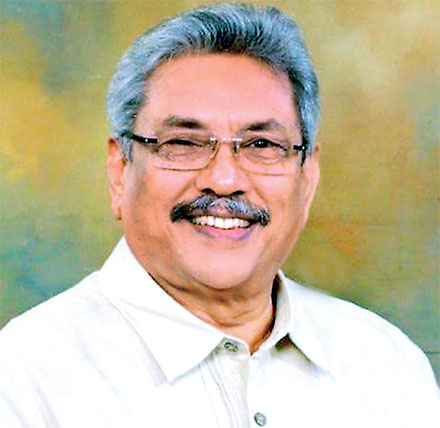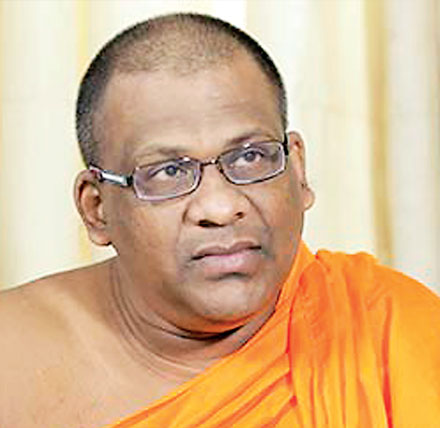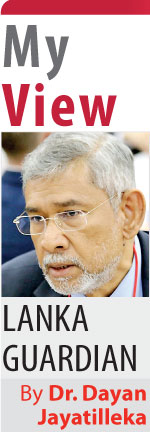Sunday Feb 15, 2026
Sunday Feb 15, 2026
Thursday, 28 October 2021 03:59 - - {{hitsCtrl.values.hits}}

President Gotabaya Rajapaksa

Ven. Galagodaaththe Gnanasara
“You hypocrites! You know how to interpret the appearance of earth and sky, but you do not know how to interpret the present time?” — Luke 12:56
|
 By the time this year ends I would have turned 65. A half-century of active engagement with politics (beginning years before I became a political scientist) and immersion in the long crisis of Sri Lanka—a long ‘gaze into the abyss’ that Nietzsche cautioned about—had left little that could really surprise or shock me. Not true.
By the time this year ends I would have turned 65. A half-century of active engagement with politics (beginning years before I became a political scientist) and immersion in the long crisis of Sri Lanka—a long ‘gaze into the abyss’ that Nietzsche cautioned about—had left little that could really surprise or shock me. Not true.
I woke up to the headline that President Gotabaya Rajapaksa had appointed Ven. Galagodaaththe Gnanasara, Head of the Bodhu Bala Sena (BBS), nationally one of the most divisive and internationally one of the most notorious of Sri Lankan personalities, as the Chairperson of the newly-minted Presidential Task Force on One Country, One Law.
One couldn’t have thought of a worse and more surreal choice. No US President, not even Trump, appointed the head of the Ku Klux Clan as Chairman of a Presidential Panel on Racial Equality. Venerable Gnanasara’s unsuitability for the post is manifestly evidenced by his speeches, most memorably at Aluthgama, and his actions, including his conduct in a Court of law, and the invasion of a Ministry in search of some transgressor or transgression. Going by media reports, Ven. Gnanasara was mentioned in the voluminous report of the Presidential Commission of Inquiry into the Easter bombing as a factor for the radicalisation of Muslims.
Racism, not nationalism
There is consistency and continuity here. As Secretary/Defence, Gotabaya Rajapaksa spoke approvingly at the opening of the BBS Political Academy. In remarks to the Daily Mirror, he said he couldn’t disagree with much of what the BBS said.
The optics of this appointment impact negatively on the international image of the Sri Lankan Government. It could kill off GSP Plus and tighten things at the UNHRC. Sri Lanka could lose us the support of the Islamic nations, the OIC. Domestically, it amounts to an ideological declaration of war against the Muslim and Catholic/Christian communities. Taken together with the consistently negative Presidential signalling on the 13th Amendment, this could take us further down the road to former Yugoslavia.
Certainly the regime’s kowtowing to China over the fertiliser consignment, the sell-offs of strategic national economic assets to US and Indian corporates and the unprecedented photo-op of President Gotabaya with a controversial Indian billionaire, when taken together with the Gnanasara appointment, prove that what is at work here is not patriotism at all, but ultranationalism, and that is not about caring for the majority of actual Sinhala-Buddhist working people or else the ‘backbone of the nation’, the Sinhala peasants would not have been subject to shock therapy and be facing destitution. It really isn’t any kind of nationalism; it is simply ethno-religious chauvinism and racism.
Is the President dog-whistling in order to swing Sinhala voters at a referendum on the new constitution which will entrench his rule and concretise his hegemonic vision of a post-war order? Then again, why would any leader lose for himself, his Government the ruling party, the Muslim and Catholic votes, having lost Tamil votes, and now the votes of the peasantry in the Sinhala rural heartland as well as the urban consumers, unless he and his inner circle do not have an electoral end-game in mind?
Medamulana: Camelot no more
After Mahinda Rajapaksa lost the Presidential Election in January 2015, masses of shocked and sorrowful Sinhala people lined up in queues outside the Rajapaksas’ ancestral home in Medamulana just to see him and express their solidarity personally. MR ensured everyone was served a cup of tea. This went on for months.
Four years later, in 2019, the stage ‘set’ for the launch of Gotabaya Rajapaksa’s presidential candidacy was dominated by a façade of the Rajapaksas’ ancestral home.
Six years after the crowds trekked to Medamulana to see Mahinda, and two years after the election of Gotabaya to the Presidency, the angry Sinhala peasants of Medamulana are marching in protest at the President’s agrarian policies, mentioning PM Mahinda as well, and being blocked by the Police on the order of a magistrate. Such are the dialectics of history, or if you like to keep it simple, ‘The Gota Effect’. (https://youtu.be/YiFxLmXpC3A)
Voodoo economics
‘Xi Jinping dials back China’s economic overhaul as masses feel pain’ was the 19 October Bloomberg story that went worldwide, appearing in many newspapers on the planet. President Xi, who doesn’t have to face elections and doesn’t lead a governing party that has to either, has nonetheless taken a prudent step back.
“…The pullback shows the difficult balancing act Xi faces in overhauling the world’s second-biggest economy in a way that doesn’t cause too much pain for the nation’s 1.4 billion people…any economic downturn that leads to social unrest risks weakening his grip on power. Slowing the pace of change in key areas would allow Xi to ease immediate pressure...”
“Xi has a low tolerance for outcomes that directly cause a lot of ordinary Chinese to suffer, because that would create serious risks to political stability and party legitimacy,” said Neil Thomas, Eurasia Group’s Analyst for China and Northeast Asia…” (https://www.aljazeera.com/economy/2021/10/19/chinas-xi-dials-back-recent-efforts-to-shake-up-businesses)
Despite greater political vulnerability and manifest social unrest, President Gotabaya Rajapaksa has chosen not to do likewise.
Whatever disagreements we have with China’s leader on brusqueness of external relations, President Xi is a rational Realist; a moderniser who believes in science and propels progress.
By contrast, in a recent televised address at an organic farm, President Gotabaya invoked the need to “go back to the way our forefathers cultivated…for thousands of years they didn’t use chemical fertilisers”. This as justification for his overnight switch from high-productivity chemical fertiliser to pre-scientific organic fertiliser including compost.
Engaging in modern agriculture on a national scale without weedicides, pesticides and chemical fertiliser is akin to war-fighting without the Air Force and Navy, or with weapons used “for thousands of years…by our forefathers”.
|
Peasant resistance
President GR wanted ‘organic’; he’s got organic: not a conversion to organic fertiliser but an ‘organic’ (in Gramsci’s sense) ‘agrarian bloc’ of resistance, from share-croppers to millers.
The peasant resistance is way ahead of the politicians; it is moving faster and further and growing larger by the day. Forget the middle-aged guys with beards and moustaches who have obviously been activists of the university student movement way back. Watch and listen to the older and younger farmers, men and women, and especially the women. Note the changed rhythm and escalating vehemence of the assault on the effigies. See the brandishing of standard agricultural implements as gestural accompaniment of impassioned denunciations, pleas and threats.
They aren’t talking about ‘exploitation’ but about ‘existence’ (‘pavathma’). They are “as mad as hell and are not gonna take it anymore” (Peter Finch in Network) because they see themselves as “innocent” of any wrong-doing and yet facing a crisis of material existence at the hands of someone “we elected, we sent to the President’s House”.
They explain that they were educated by their parents who worked in the fields, and that they are similarly educating their children or hope to educate their children by their earnings in agriculture. Unlike the ruling-elite they can’t pay tuition fees for their children to study in the USA and UK, they exclaim.
The Sinhala peasant is deeply democratic-minded, not servile. They don’t take kindly to parade-ground orders and the barracks style. “‘Eya’ – he – [the President] just orders and expects us to do,” snorted a disgusted, scornful peasant to the visiting Government MP Amarasiri, while camped out on a hunger-strike.
They challenge the rulers to prove that anyone can convert to successfully farming overnight without weedicide, pesticide and chemical fertiliser. One young farmer, intermittently lifting a long-handled mamoty for emphatic punctuation, pledged to crawl on his belly from one township to another if Agriculture Minister Mahindananda could prove this preposterous Presidential proposition.
The peasants suspect that the rulers are trying to drive them into destitution so that they are driven off their farms which will then be given to corporate farming. They have already noticed “wealthy outsiders” clearing nearby forests, diverting water sources, marking out lands for commencing cultivation.
The peasants say the present rulers are as bad or worse than the British colonialist occupiers in their destruction of agriculture. They threaten to bring their agricultural implements and march on the homes of the decision-makers who threaten their crops, livelihoods and hopes.
The peasant protest is on the cusp of a ‘Govi Hartal’; a peasant uprising. If coercively suppressed by the Police, STF and the military, it will result in the first rural rebellion in almost two centuries, and may even light the fuse of the first rural guerrilla struggle in post-Independence Sri Lanka. That will be the real harvest of President Gotabaya’s absurd, arbitrary agrarian policy.
Crisis causation
The root of the current crisis is the ideological construct in which the President himself dwells and which now seeks constitutional incarnation. That construct is that the military won the war and therefore deserves the lion’s share of power, influence, status and stakeholder ability to shape the post-war order.
The Soviet Red Army more than any other, broke the back of the Nazi-fascist military monster, but the political vanguard, i.e., Stalin and the Communist Party, remained fully in command thereafter.
The PLA won the wars that liberated China, but “The party commands the gun, and not the gun, the party” insisted Mao Zedong, a military genius, who famously declared “politics in command”.
President Gotabaya Rajapaksa and his inner-circle of ex-military brass and ultranationalists fail to grasp that the war against the Tigers was not won by the Sri Lankan State and regime as currently militarised and re-composed by him. It was won by the normal, conventional, civilian-democratic Sri Lankan State of the sort that existed for decades, but under a much more determined political (and military) leadership than before—like America under Lincoln and Britain under Churchill. President Mahinda Rajapaksa led and won the war not with the 20th Amendment or 18th Amendment (nor of course the debilitating 19th Amendment) in place, but with the reformist 13th Amendment and 17th Amendment as parts of the State.
The pluralist-democratic civilian character of the Sri Lankan State gave us the moral-ethical high ground in relation to the terrorist enemy.
We won the war because of what we were then, and the way we were then; not what we have become now, not the way we are now. The solemn commitment to implement the 13th Amendment was one of the strategic ingredients of winning that war.
Therefore, the ideological construct that “we, the patriotic military, won the war and must rightfully dominate the State and determine the shape of the post-war order in accordance with that role” is more than a distortion. It is a lie. It is the determinant cause of the crisis of the Gotabaya regime and of Sri Lanka under that regime.
Not the solution
As for the Lankan liberal solution, namely a united platform for the abolition of the executive presidency, here’s my Realist take as a political scientist:
(1) From Marcos to Pinochet, Fujimori to Trump, you remove the autocrat/autocracy, not the office (though you may reform it). Hitler was Reich Chancellor. So was Merkel.
(2) Most Sinhalese won’t risk entrenching Tamil provincial autonomy while abolishing an overarching, directly-elected presidency. Though it needs reform, the Presidency balances the semi-autonomous Tamil provinces neighbouring India/Tamil Nadu. It’s a package-deal or a zero-sum game.
(3) The people relate to the office of the (directly elected) Presidency (the post, not the incumbent) more than they do the Parliament, Parliamentarians and the Ministers (“225 buffaloes”).
|
Real history
When Prabhakaran ordered the Tamils to boycott the Presidential Election of 2005 he did so because he thought Mahinda Rajapaksa was a Sinhala-Buddhist hardliner who would be isolated internationally and regionally, and would therefore be easier to defeat. We proved Prabhakaran’s crucial international calculation wrong. We held our ground in Geneva, preventing a move from early 2009 when US Secretary of State Hillary Clinton and UK Foreign Secretary David Miliband were jointly pushing for a cessation of hostilities and resumption of negotiations, and we then went on to prevail in the vote at the UNHRC special session of May 2009.
Ambassador Sha Zukang, China’s legendary diplomat, the first ‘wolf warrior’ but a sophisticated maestro who was UN Under-Secretary-General during our war years, told me in Geneva and Lisbon—which I conveyed to President MR—that the West was looking for a UN resolution to stop the war; it knew it could secure it only in Geneva which had no veto-wielding China and Russia to defend Sri Lanka as in New York; and had it obtained that UN mandate in Geneva it would have invoked R2P and acted to stop the war short of final victory. “You denied them that mandate and then gave them a negative one,” Ambassador Sha commended me, saying he had said that to UN Human Rights High Commissioner Navi Pillay. That was June 2009. I was fired in July.
As the influence of the hawkish defence establishment spearheaded or fronted by Secretary/Defence Gotabaya Rajapaksa grew and impacted policy, our diplomatic discourse and strategy changed, as did its outcome. Sri Lanka lost votes on resolutions in Geneva in 2012, 2013 and 2014.
We could not have won the war under the political leadership of President Gotabaya Rajapaksa. Prabhakaran’s gamble would have worked: we would have been isolated internationally, including from India, and would not have been allowed to win (as happened before). We may have experienced an R2P propelled intervention, which the LTTE was expecting right up to the very end and which the pro-Tiger Diaspora pulled out all the stops to achieve including a traffic- blocking flood of demonstrators in Geneva climaxing in self-immolation by an accountancy student from London just outside the UNHRC in the run-up to the vote.
The historical zenith of Sri Lankan—and largely Sinhala—achievement since Independence wasn’t November 2019, the election of Gotabaya Rajapaksa as President, his investiture and discourse at the Ruvanwelisaya. It was 10 days in May 2009 with its twin victories, in the hot war on the ground on our island and in the cold war far from our shores in foreign terrain, at the United Nations in Geneva. November 2019 was local FOX News driven hype, a bubble of delirious delusion, as is increasingly obvious. May 2009 was real history, the real historical peak of indelible victorious achievement.
The aberrant governance model of President Gotabaya Rajapaksa can’t win the peace—neither post-war reconciliation nor social peace. The Sinhala-Buddhist peasantry from whose collective womb sprang the army that won the war, is now rending the air with curses against the rulers. Meanwhile Cardinal Malcolm Ranjith is sure that the power-wielders will fail and have already begun to, because the wrath of God is being visited upon them just as it was on Egypt’s obdurate Pharoah in the Book of Exodus.